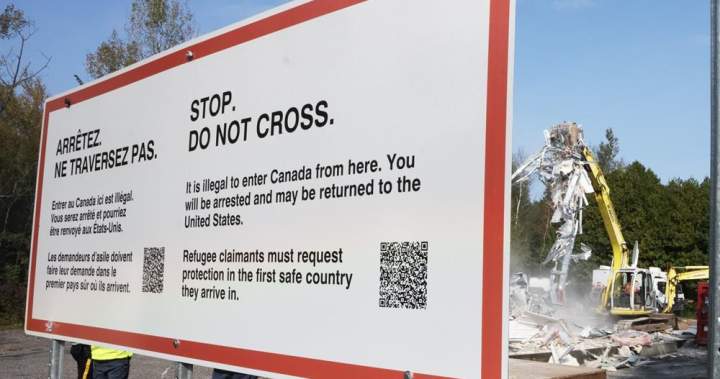In a startling development that highlights the growing concerns of human trafficking along Canada’s borders, three men have been remanded in custody following the discovery of 44 migrants packed inside a commercial truck in southern Quebec. The vehicle was intercepted last week during a routine inspection at the Lacolle border crossing, revealing one of the largest human smuggling operations uncovered in the region this year.
The suspects—Ismail Ahmed, 37, Maher Al-Jashaami, 42, and Khalid Muhammad, 29—appeared before a Saint-Jean-sur-Richelieu court yesterday, facing multiple charges including human trafficking, conspiracy, and endangering human life. The Quebec provincial police, working in conjunction with the Canada Border Services Agency, made the arrests after border agents noticed suspicious activity during the vehicle inspection.
“What we found was deeply disturbing,” said RCMP Superintendent Marie Beaumont. “These individuals were being transported in dangerous and inhumane conditions, with limited ventilation, no access to water, and cramped quarters that posed significant health risks.”
According to court documents obtained by CO24, the migrants—primarily from Somalia, Syria, and Bangladesh—had each allegedly paid between $5,000 and $15,000 to be transported across the border. Many reported being in transit for over 30 hours without adequate food or water.
The Canada Border Services Agency reports that human smuggling attempts along the Quebec-U.S. border have increased by approximately 27% over the past year. This case represents one of the most significant interceptions, both in terms of the number of individuals involved and the sophisticated nature of the operation.
Immigration attorney Philippe Tremblay notes that these types of smuggling operations often target vulnerable populations. “What we’re seeing is increasingly organized criminal networks exploiting desperate people who are seeking better lives,” Tremblay told CO24. “The financial incentives for smugglers are enormous, while the risks to migrants are potentially fatal.”
The Royal Canadian Mounted Police has established a special task force dedicated to combating human trafficking along the border, with increased surveillance and cooperation with U.S. authorities. The investigation into this particular case revealed connections to a larger network operating throughout eastern North America.
“This isn’t simply about illegal entry—it’s about human dignity and safety,” said Immigration Minister Marc Miller in a statement released yesterday. “These smuggling networks put lives at risk while profiting from human desperation.”
The 44 migrants are currently being processed by immigration authorities, with many expected to make asylum claims. Support services have been provided to address immediate health concerns resulting from the dangerous journey.
Legal experts anticipate this case could lead to significant prison sentences if convictions are secured. Under Canadian law, human smuggling carries penalties of up to life imprisonment when aggravating factors such as endangerment are present.
As Canada’s immigration system faces increasing pressure from global migration patterns, this case raises critical questions about border security and humanitarian responsibilities. What measures should be implemented to dismantle these trafficking networks while still upholding Canada’s commitment to refugee protection?










